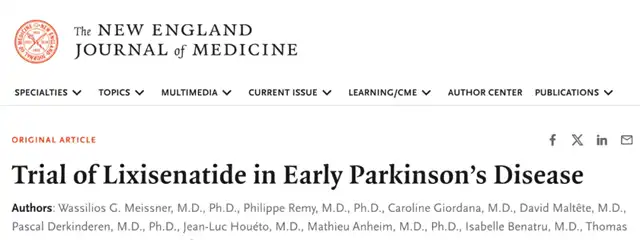GLP-1 drugs slow progression of Parkinson’s disease in clinical trial
- Normal Liver Cells Found to Promote Cancer Metastasis to the Liver
- Nearly 80% Complete Remission: Breakthrough in ADC Anti-Tumor Treatment
- Vaccination Against Common Diseases May Prevent Dementia!
- New Alzheimer’s Disease (AD) Diagnosis and Staging Criteria
- Breakthrough in Alzheimer’s Disease: New Nasal Spray Halts Cognitive Decline by Targeting Toxic Protein
- Can the Tap Water at the Paris Olympics be Drunk Directly?
GLP-1 drugs slow progression of Parkinson’s disease in clinical trial
- Should China be held legally responsible for the US’s $18 trillion COVID losses?
- CT Radiation Exposure Linked to Blood Cancer in Children and Adolescents
- FDA has mandated a top-level black box warning for all marketed CAR-T therapies
- Can people with high blood pressure eat peanuts?
- What is the difference between dopamine and dobutamine?
- How long can the patient live after heart stent surgery?
GLP-1 drugs slow progression of Parkinson’s disease in clinical trial
Parkinson’s disease (PD) is a debilitating neurodegenerative disorder affecting approximately 10 million people globally, with no cure currently available. Its symptoms include rhythmic tremors, slowed movements, speech difficulties, and balance problems, which worsen over time.
Researchers have been interested in a class of drugs known as GLP-1 receptor agonists, which mimic gut hormones and are commonly used to treat type 2 diabetes and obesity (such as the widely sold exenatide). GLP-1 receptor agonists are also believed to have the potential to protect neurons. However, clinical evidence of benefit for patients has been limited.
On April 3, 2024, the prestigious medical journal New England Journal of Medicine (NEJM) published a study titled “Trial of Lixisenatide in Early Parkinson’s Disease.”
This phase 2 clinical trial demonstrated that a GLP-1 receptor agonist used to treat diabetes, Lixisenatide (developed by Sanofi), slowed the progression of Parkinson’s disease-related motor impairments after 12 months of treatment.
The accompanying editorial in NEJM noted: “The importance of this finding lies not in the magnitude of the change but in what it portends.”

In this new study, researchers recruited 156 early-stage Parkinson’s disease patients in France and randomly assigned them in a 1:1 ratio to receive either Lixisenatide (developed by Sanofi) or a placebo. Both groups had a baseline MDS-UPDRS Part III score of approximately 15.
After one year of treatment, patients receiving Lixisenatide showed no worsening of motor symptoms, while those receiving placebo experienced continued deterioration of motor symptoms.
Specifically, at 12 months, the change in MDS-UPDRS Part III scores was -0.04 in the treatment group and +3.04 in the placebo group. At 14 months, after a two-month washout period, the mean MDS-UPDRS motor score in the off-medication state was 17.7 in the treatment group and 20.6 in the placebo group. There were no significant differences between the two groups in other outcomes related to secondary endpoints. In terms of safety, 46% of the treatment group experienced nausea, and 13% experienced vomiting.
Overall, this phase 2 clinical trial suggests that in early-stage Parkinson’s disease patients, Lixisenatide slows the progression of motor impairments compared to placebo after 12 months of treatment, but this effect is associated with gastrointestinal side effects. Further, longer-term and larger-scale clinical trials are needed to determine the effectiveness and safety of Lixisenatide in Parkinson’s disease patients.
The research team stated that this is the first time that GLP-1 receptor agonists have been shown to impact the progression of Parkinson’s disease and explain this effect through neuroprotective actions. Clinically, Lixisenatide has a moderate therapeutic effect on Parkinson’s disease, but this may be because the disease progresses slowly. With another year of follow-up, the difference may become more pronounced.
Paper link: NEJM
GLP-1 drugs slow progression of Parkinson’s disease in clinical trial
(source:internet, reference only)
Disclaimer of medicaltrend.org
Important Note: The information provided is for informational purposes only and should not be considered as medical advice.



